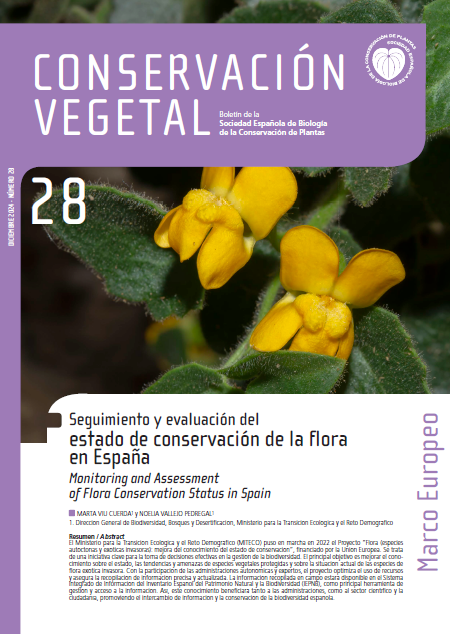Citizen science and plant conservation: The experience of Biodibal in the Balearic Islands
Keywords:
Biodiversity, Flora, Management, Participative science, mobile appAbstract
Citizen science has emerged as a vital tool for biodiversity conservation, involving the community in the collection of scientific data. A notable example is the Biodibal project, initiated in 2017 by the University of the Balearic Islands and Red Eléctrica, which has 1 799 814 biodiversity observations in the Balearic Islands. This project allows citizens to record observations via mobile devices, which are then validated by specialists. However, it faces challenges such as nomenclature changes, difficulty in identifying taxa from images, and technical issues.
Despite representing only 5,95 % of Biodibal’s total data, citizen science observations have been crucial, with 98,63 % of them validated, covering 3827 taxa. Additionally, the project has facilitated the creation of open databases and has been used in education and research, contributing to botanical publications. Although data quality and participant motivation are challenges, citizen science has great potential for global biodiversity conservation through replicable projects like Biodibal
Downloads
References
• Biodibal (2024) Data export report. https://biodibal.uib.cat accessed via Biodibal on 2024-06-28.
• Cerrato MD, Cardona C, Mir-Rosselló PM, Ribas-Serra A, Albertí-Roig I, Cortés-Fernández I,
Lassnig N, López-Vich L & L Gil Vives (2023a). Notas corológicas para la flora de Mallorca III. Flora
Montiberica 86: 67-73.
• Cerrato MD, Ribas-Serra A, Mir-Rosselló PM, Cardona C, Cortés-Fernández I, Perelló-Suau S, Pinya S & L Gil Vives (2023b).
Records of alien plants new for the flora of the Balearic Islands (West-Mediterranean). Bioinvasions records 12(4): 887-898.
• Gil Vives L, Cardona Ametller CV & A Ribas-Serra (2023). Flora vascular de Mallorca, Illes Balears. Version 1.4. Universitat de les Illes Balears. Occurrence dataset https://doi.org/10.15470/bftzuw accessed via GBIF.org on 2024-06-28.
• Mir-Rosselló PM, Salom-Vicens L, Gil Vives L, López-Vich L, Cerrato MD, Ribas-Serra A, Far Morenilla AJ, Sáez-Gonyalons L, Cortés-Fernández I, Roselló-Salvadó M, Sicilia Martín D & CV Cardona Ametller (2024). Cryptogams of the Balearic Islands. Universitat de les Illes Balears. Occurrence dataset https://doi.org/10.15470/ffrnjq accessed via GBIF.org on 2024-06-28.
• Perelló E, Lassnig N, Llobet-Deià R, Homs C, Ruíz M & S Pinya (2018). BioBal (REE-UIB) Un projecte interdisciplinari per a donar a conèxier la biodiversitat de les Iles Balears amb una triple vessant científica-gestió, educativa i d’impuls del turisme de natura. En: Pons GX, del Valle L, Vicens D, Pinya S, McMinn M & F Pomar (eds). Llibre de ponències i resums de les VII Jornades de Medi Ambient de
les Illes Balears. Societat d’Història Natural de les Balears (SHNB) & Universitat de les Illes Balers (UIB), Palma.
• Perelló E, Llobet R, Lassnig N, & S Pinya (2022). Biodibal: ciencia, turisme i biodiversitat. En: Pons GX, del Valle L, McMinn M, Pinya S, Vicens D (eds). Llibre de ponències i resums de les VIII Jornades de Medi Ambient de les Illes Balears. Societat d’Història
Natural de les Balears (SHNB) & Universitat de les Illes Balears (UIB), Palma.
